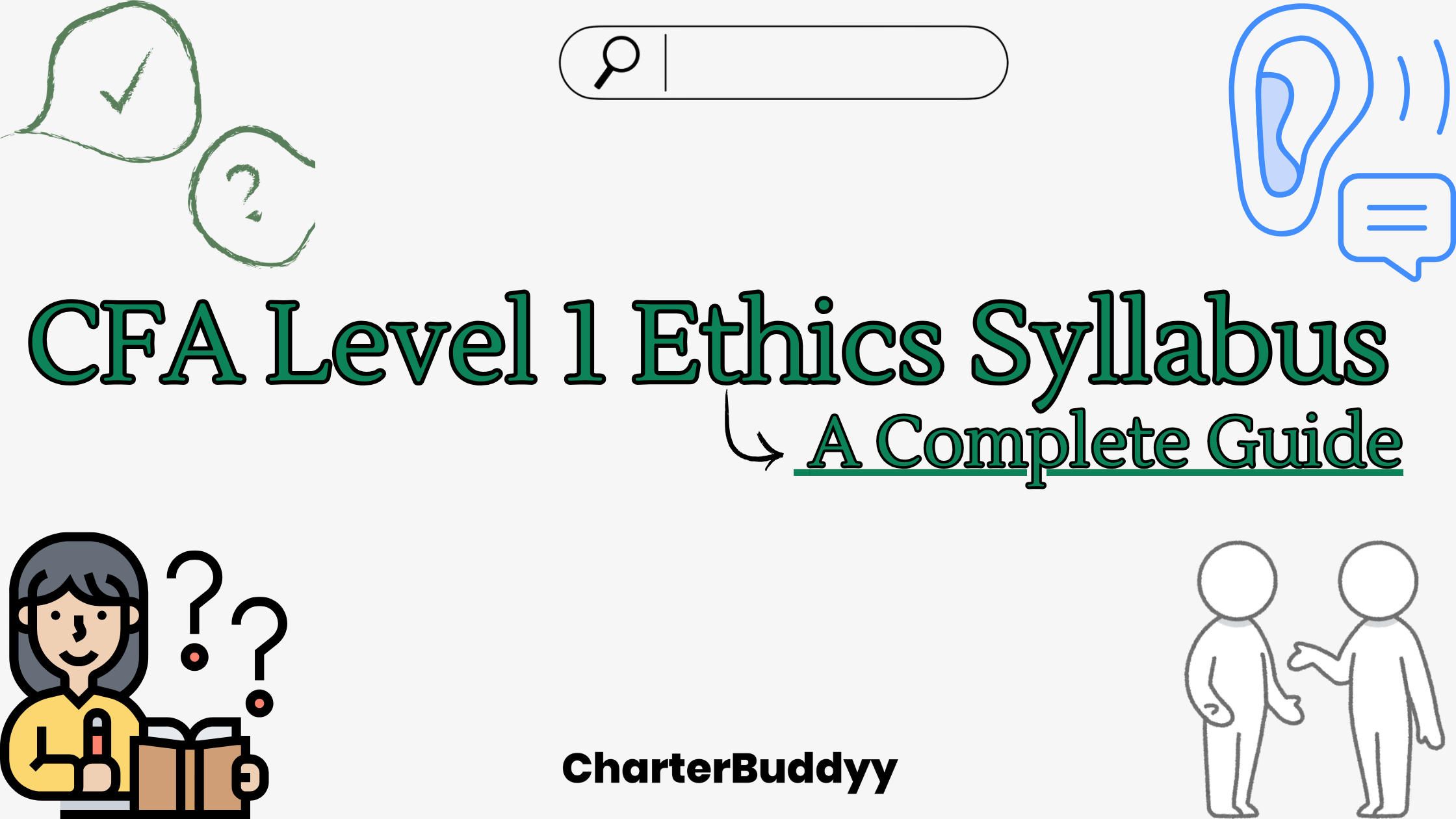
Ethics in the CFA Level 1 curriculum is one of the most important areas to focus on.
While most candidates face difficulty in understanding this topic, we have come up with a simple guide to help you focus on tackling ethics and its concepts smoothly.
This guide provides a detailed breakdown of the CFA Level 1 Ethics syllabus, including the key learning modules, the 6 Codes of Ethics, and the 7 Standards of Professional Conduct.
Level 1 Ethics: Overview
Ethics is one of the most heavily tested topics in the CFA Level 1 exam, typically accounting for 15-20% of the total exam weight. The CFA Institute emphasizes ethics across all three levels of the exam, and ethical decision-making is a core skill for investment professionals.
The main aim of the CFA Institute is to prepare future professionals to act in the best interest of the client at all times, be transparent, and most importantly, maintain client trust.
Key areas covered in Level 1 Ethics:
- Importance of ethics and trust in the investment profession
- CFA Code of Ethics and Standards of Professional Conduct.
- Guidance for applying the 7 standards.
- Introduction to Global Investment Performance Standards (GIPS)
- How to apply ethical principles in real-world investment scenarios
Ethics Learning Modules in CFA Level 1
The Ethics syllabus is divided into five major learning modules or readings , covering foundational ethical principles and their applications:
-
Reading 89: Ethics and Trust in the Investment Profession
- Defines ethics and explains its significance in finance.
- Discusses professional codes of ethics and how they establish trust.
- Differentiates ethical vs. legal standards in investment management.
- Provides a framework for ethical decision-making.
-
Reading 90: Code of Ethics and Standards of Professional Conduct
- Covers the CFA Institute Code of Ethics and Professional Conduct Standards.
- Explains ethical responsibilities in investment management.
- Introduces the CFA Professional Conduct Program and how ethical violations are addressed.
-
Reading 91: Guidance for Standards I–VII
- A detailed breakdown of the seven Standards of Professional Conduct.
- The 7 Standards of Professional conduct are as follows.
- Includes real-world applications and case studies.
-
Reading 92: Global Investment Performance Standards (GIPS)
- Explains why the GIPS standards were created and who benefits from them.
- Covers performance reporting principles and verification requirements.
-
Reading 93: Ethics Application
- Applies ethical principles to real-world investment scenarios.
- Includes case studies that test understanding of the CFA Code of Ethics.
The 6 CFA Code of Ethics:
The CFA Institute Code of Ethics outlines six fundamental principles that CFA charterholders must follow:
- Act with integrity, competence, diligence, respect, and in an ethical manner with the public, clients, prospective clients, employers, employees, colleagues in the investment profession, and other participants in the global capital markets.
- Place the integrity of the investment profession and the interests of clients above their own personal interests.
- Use reasonable care and exercise independent professional judgment when conducting investment analysis, making investment recommendations, taking investment actions, and engaging in other professional activities.
- Practice and encourage others to practice in a professional and ethical manner that will reflect credit on themselves and the profession.
- Promote the integrity and viability of the global capital markets for the ultimate benefit of society.
- Maintain and improve their professional competence and strive to maintain and improve the competence of other investment professionals.
These 6 codes must be read and understood properly to know what the CFA Institute expects from finance professionals who earn the CFA charter or are CFA candidates.
Similarly, the 7 Standards of Professional Conduct guide professionals in making the most appropriate and ethical decisions in their profession.
The 7 Standards of Professional Conduct:
The CFA Institute Standards of Professional Conduct provide detailed guidelines on ethical behavior in investment management. These standards form the core of the CFA Ethics syllabus and are frequently tested in the exam.
-
Standard I: Professionalism
- Knowledge of the Law
- Independence and Objectivity
- Misrepresentation
- Misconduct
- Competence
-
Standard II: Integrity of Capital Markets
- Material Nonpublic Information
- Market Manipulation
-
Standard III: Duties to Clients
- Loyalty, Prudence, and Care
- Fair Dealing
- Suitability
- Performance Presentation
- Preservation of Confidentiality
-
Standard IV: Duties to Employers
- Loyalty
- Additional Compensation Arrangements
- Responsibilities of Supervisors
-
Standard V: Investment Analysis, Recommendations, and Actions
- Diligence & Reasonable Basis
- Communication with Clients and Prospective Clients
- Record Retention
-
Standard VI: Conflicts of Interest
- Avoid or Disclose Conflicts.
- Priority of Transactions
- Referral Fees
-
Standard VII: Responsibilities as a CFA Institute Member
- Conduct as Participants in CFA Institute Programs.
- Reference to CFA Institute, the CFA Designation, and the CFA Program.
Why Ethics is Crucial for the CFA Exam
We know that ethics has the highest weightage in the CFA exam pattern. But most importantly, there is something known as the “Ethics Adjustment” that can help you greatly
If you have performed weakly or failed in other subjects, a strong performance in the Ethics section can push you over the passing mark!
This is known as the "Ethics Adjustment", which means ethical scores can impact final results.
-
Best Study Strategy for Ethics:
- Focus on understanding real-world applications rather than just memorizing concepts.
- Practice ethics case studies to apply principles in different scenarios.
- Review past CFA exam ethics questions to understand how they are tested.
For more tips on mastering CFA ethics, check out this blog.
Conclusion
The Ethics and Professional Standards section is one of the most important areas of the CFA Level 1 exam. It builds the foundation for professional conduct and integrity in investment management.
The 6 Code of Ethics needs to be revised regularly and understood to attempt related questions.
Understanding the 7 Standards of Professional Conduct and its application rather than memorizing it is the only way to do well in this section.
Not forgetting GIPS, candidates need to ensure that they learn this topic and memorize key concepts as related questions are asked in the exam.
Remember, Ethics can be attempted successfully with practice. Do not leave till the last moment, and attempt as many questions as possible.
Table of Contents
- Level 1 Ethics: Overview
- Ethics Learning Modules in CFA Level 1
- The 6 CFA Code of Ethics:
- The 7 Standards of Professional Conduct:
- Why Ethics is Crucial for the CFA Exam
- Conclusion

